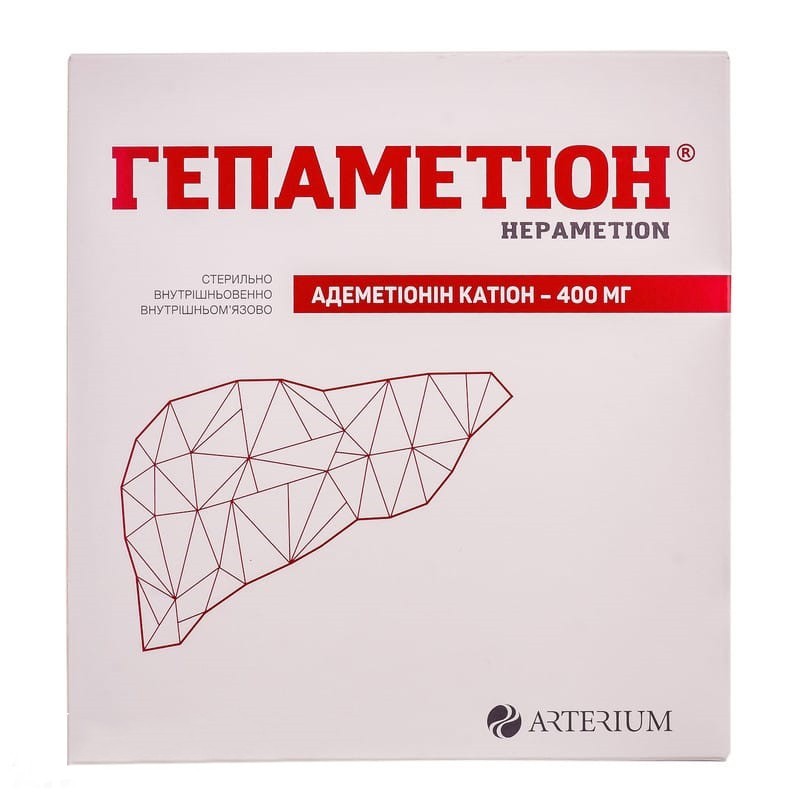



 Secure and encrypted payment processing
Secure and encrypted payment processing We ship to over 40 countries including the USA, UK, Europe, Australia and Japan
We ship to over 40 countries including the USA, UK, Europe, Australia and Japan Guaranteed refund or reship if you haven't received your order
Guaranteed refund or reship if you haven't received your orderS-adenosyl-L-methionine (ademethionine) is a natural amino acid that is present in almost all tissues and body fluids. Ademethionine mainly acts as a coenzyme and a methyl group donor in transmethylation reactions, which is a necessary metabolic process in humans and animals. The transfer of methyl groups (transmethylation) is also a necessary metabolic process in the construction of a double phospholipid layer in cell membranes and promotes membrane fluidity.
Ademethionine is able to penetrate the blood-brain barrier. The process of transmethylation with the participation of ademetionine is key in the formation of neurotransmitters of the central nervous system, including catecholamines (dopamine, norepinephrine, adrenaline), serotonin, melatonin and histamine.
Ademethionine is also a precursor in the formation of physiological sulfurized compounds (cysteine, taurine, glutathione, coenzyme A, etc.) in transulfurization reactions. Glutathione, a powerful antioxidant in the liver, plays an important role in hepatic detoxification. Ademethionine increases the level of hepatic glutathione in patients with liver damage of both alcoholic and nonalcoholic origin. Folic Acid (Folates) and Vitamin B 12 are necessary constituents in the processes of metabolism and recovery of ademetionine.
Genetic defects affecting the methionine cycle and / or causing homocystinuria and / or hyperhomocysteinemia (for example, cystathionine beta-synthase deficiency, a defect in vitamin B metabolism 12 ).
Hypersensitivity to any component of the drug.
Treatment may begin with parenteral administration of the drug, followed by the use of the drug in the form of tablets or immediately after the use of tablets. The daily dose of tablets can be divided into 2-3 doses. Prepare a solution for injection immediately before use.
Initial therapy
Intravenously or intramuscularly: the recommended dose is 5-12 mg / kg of body weight per day. The usual initial dose is 400 mg / day, the total daily dose should not exceed 800 mg. The duration of initial parenteral therapy is 15–20 days in the treatment of depressive syndromes and 2 weeks in the treatment of liver diseases.
Orally (inside): for oral administration, ademetionine in the form of tablets should be used. The recommended dose is 10–25 mg / kg body weight per day. The initial dose is 800 mg / day (2 tablets), the total daily dose should not exceed 1600 mg (4 tablets).
Maintenance therapy
Apply orally by 2–4 tablets per day (800–1600 mg / day).
The duration of therapy depends on the severity of the disease and is determined individually by the doctor.
For intramuscular or intravenous use, lyophilized powder should be dissolved in the special solvent supplied immediately before use. For administration, the required dose of ademethionine must be further diluted in 250 ml of physiological saline or 5% glucose (glucose) solution and infusion is carried out slowly for 1-2 hours. The unused portion of the solution must be discarded.
Ademethionine should not be mixed with alkaline solutions or solutions containing calcium ions. If the lyophilized powder has a color other than white to yellowish (due to the presence of cracks in the vial or due to the influence of elevated temperature), it is necessary to refrain from its use.
Ademetionine overdose cases have been reported rarely. In case of an overdose, doctors should contact local poison control centers.Monitoring of the patient is recommended and, if necessary, the use of symptomatic treatment.
During clinical trials in women who were treated with ademetionine in the third trimester of pregnancy, no adverse reactions were observed. Ademethionine in the I and II trimester of pregnancy should be used only after a thorough assessment by the doctor of the ratio of benefits for the pregnant woman / risk to the fetus.
During breastfeeding, ademetionine can be used only when the potential benefits of its use outweigh the potential risk to the infant.
The safety and effectiveness of the use of ademetionine in children have not been established.
In some patients, dizziness may occur during ademetionine therapy. In such cases, one should refrain from driving vehicles or working with other mechanisms until the symptoms disappear completely, which may affect the reaction rate in these types of activities.
1 bottle with lyophilisate contains:
active substance: S-adenosyl-L-methionine 1,4-butanedisulfonate 760 mg in terms of ademetionine cation - 400 mg;
1 ampoule with solvent contains: L-lysine, sodium hydroxide, water for injection.
Store in the original packaging at a temperature not exceeding 25 ° C. Keep out of the reach of children.
Shelf life:
Lyophilisate - 3 years.
The solvent is 3 years.
The shelf life of the final preparation is determined relative to the component (lyophilisate or solvent) whose shelf life expires earlier.
Ademethionine (injection) should not be mixed with alkaline solutions or solutions containing calcium ions.